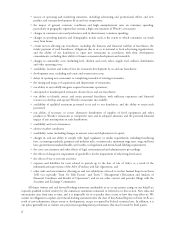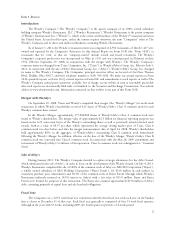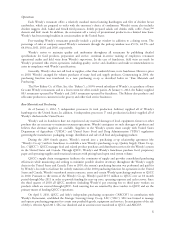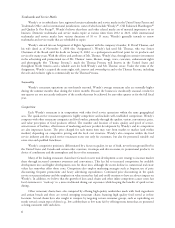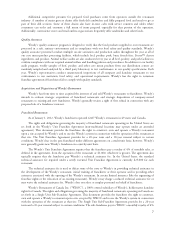Wendy's 2011 Annual Report Download - page 16
Download and view the complete annual report
Please find page 16 of the 2011 Wendy's annual report below. You can navigate through the pages in the report by either clicking on the pages listed below, or by using the keyword search tool below to find specific information within the annual report.If company-owned and franchised restaurants are unable to adapt to changes in consumer preferences and
trends, company-owned and franchised restaurants may lose customers and the resulting revenues from company-
owned restaurants and the royalties that we receive from franchisees may decline.
The disruptions in the national and global economies and the financial markets may adversely impact our
revenues, results of operations, business and financial condition.
The disruptions in the national and global economies and financial markets, and the related reductions in the
availability of credit, have resulted in high unemployment rates and declines in consumer confidence and spending,
and have made it more difficult for businesses to obtain financing. If such conditions persist, then they may result in
significant declines in consumer food-away-from-home spending and customer traffic in our restaurants and those of
our franchisees. Such conditions may also adversely impact the ability of franchisees to build or purchase restaurants,
remodel existing restaurants, renew expiring franchise agreements and make timely royalty and other payments. There
can be no assurance that government responses to the disruptions and volatility in the financial markets will restore
consumer confidence, stabilize the markets or increase liquidity and the availability of credit. If we or our franchisees
are unable to obtain borrowed funds on acceptable terms, or if conditions in the economy and the financial markets
do not improve, our revenues, results of operations, business and financial condition could be adversely affected.
Additionally, we have entered into interest rate swaps and other derivative contracts as described in Note 13 to
the Financial Statements and Supplementary Data included in Item 8 herein, and we may enter into additional swaps
in the future. We are exposed to potential losses in the event of nonperformance by counterparties on these
instruments, which could adversely affect our results of operations, financial condition and liquidity.
Changes in commodity costs (including beef, chicken and corn), supply, fuel, utilities, distribution and other
operating costs could harm results of operations.
Our profitability depends in part on our ability to anticipate and react to changes in commodity costs
(including beef, chicken and corn), supply, fuel, distribution and other operating costs. Any increase in these costs,
especially beef or chicken prices, could harm operating results. In addition, our brand is susceptible to increases in
these costs as a result of other factors beyond its control, such as weather conditions, global demand, food safety
concerns, product recalls and government regulations. Additionally, prices for feed ingredients used to produce beef
and chicken could be adversely affected by changes in global weather patterns, which are inherently unpredictable.
Increases in gasoline prices would result in the imposition of fuel surcharges by our distributors, which would increase
our costs. Significant increases in gasoline prices could also result in a decrease in customer traffic at our restaurants,
which could adversely affect our business. We cannot predict whether we will be able to anticipate and react to
changing food costs by adjusting our purchasing practices and menu prices, and a failure to do so could adversely
affect our operating results. In addition, we may not seek to or be able to pass along price increases to our customers.
Shortages or interruptions in the supply or delivery of perishable food products could damage the Wendy’s brand
reputation and adversely affect our operating results.
Wendy’s and its franchisees are dependent on frequent deliveries of perishable food products that meet brand
specifications. Shortages or interruptions in the supply of perishable food products caused by unanticipated demand,
problems in production or distribution, disease or food-borne illnesses, inclement weather or other conditions could
adversely affect the availability, quality and cost of ingredients, which could lower our revenues, increase operating
costs, damage brand reputation and otherwise harm our business and the businesses of our franchisees.
Food safety events, including instances of food-borne illness (such as salmonella or E. Coli) involving Wendy’s or
its supply chain, could create negative publicity and adversely affect sales at the brand.
Food safety is a top priority, and we dedicate substantial resources to ensure that our customers enjoy safe,
quality food products. However, food safety events, including instances of food-borne illness (such as salmonella or E.
Coli), have occurred in the food industry in the past, and could occur in the future.
Food safety events could adversely affect the price and availability of beef, poultry or other meats. As a result,
Wendy’s restaurants could experience a significant increase in food costs if there are food safety events whether or not
such events involve Wendy’s restaurants or restaurants of competitors.
12


